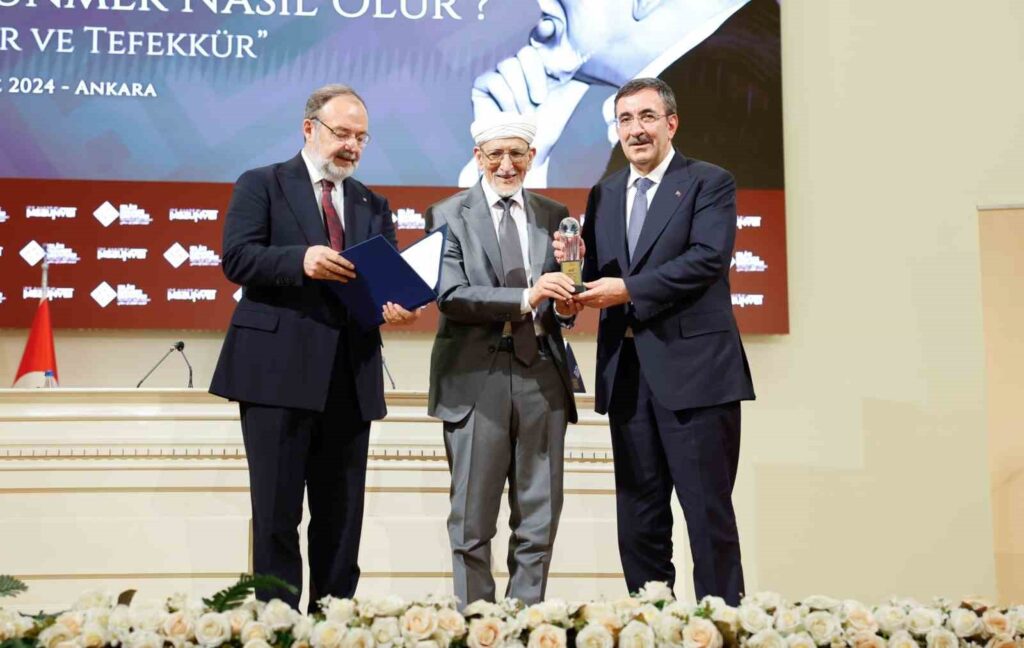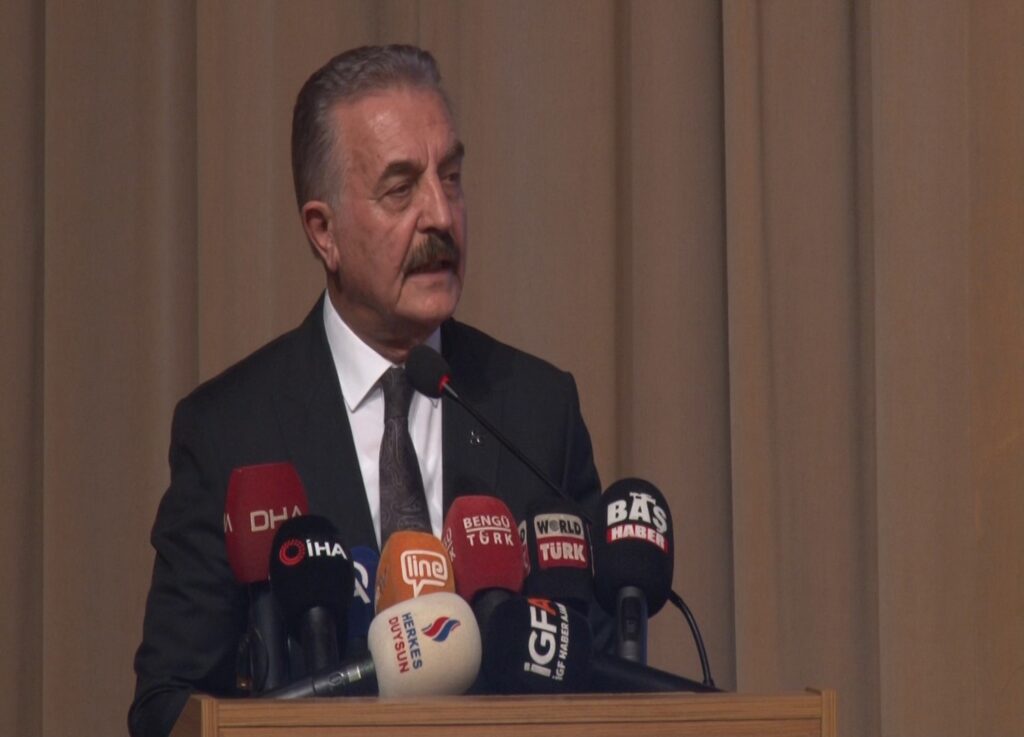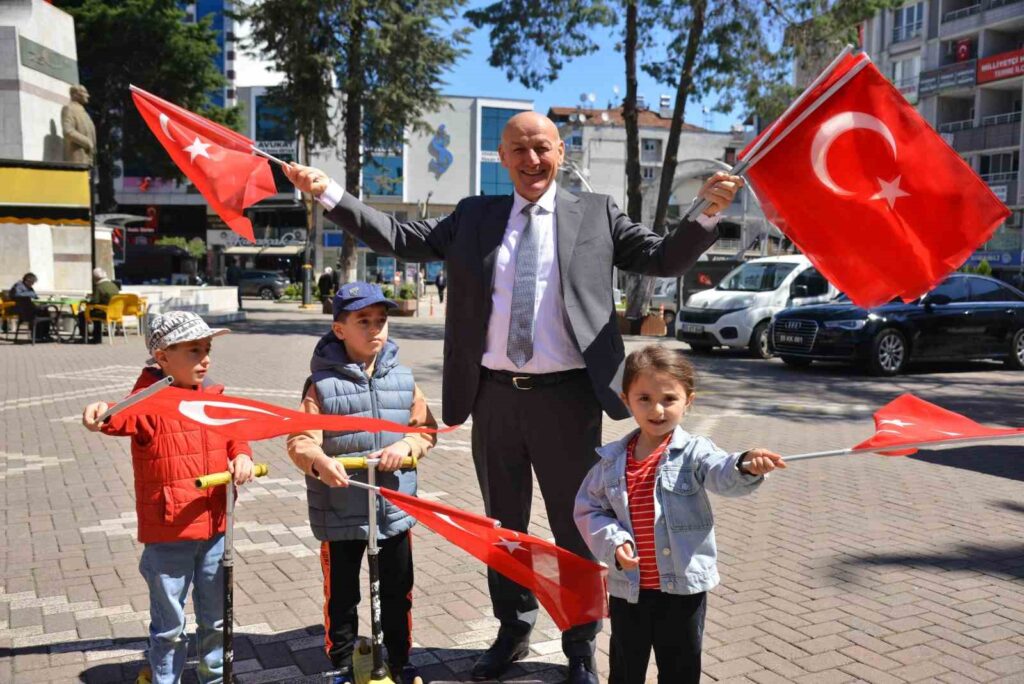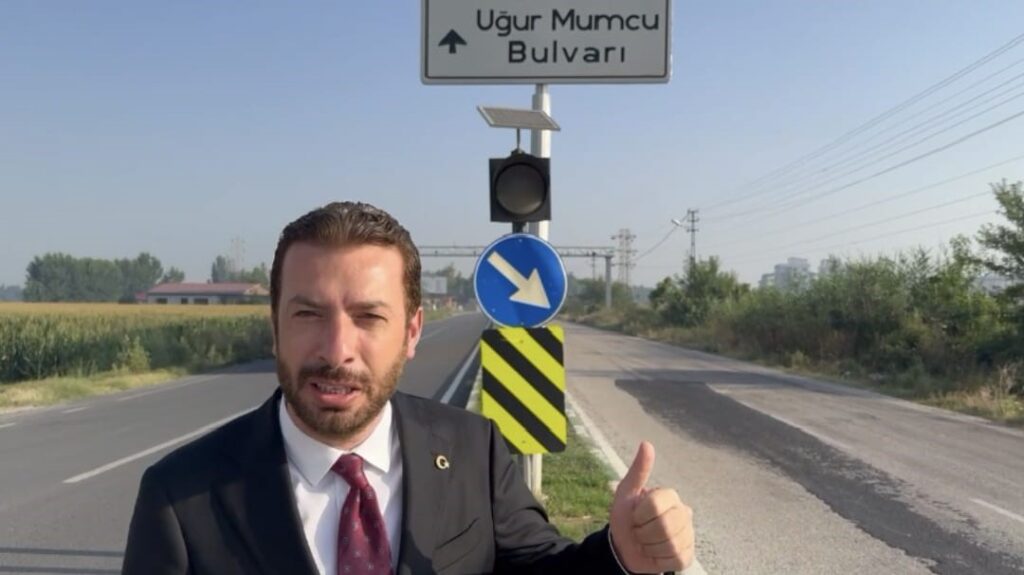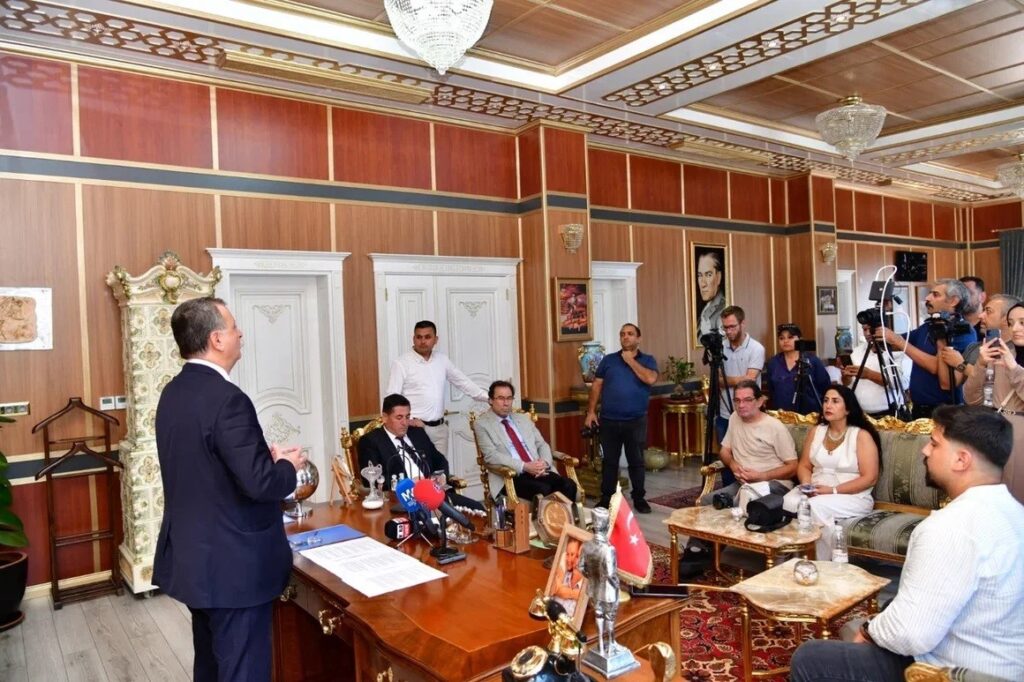Minister Tunç: “We need a new constitution that will enable us to progress with firm steps on the path of high-standard democracy.”
Minister of Justice Yılmaz Tunç stated, “We are on the threshold of the Century of Turkey. In these days when we step into the 2nd century of our Republic, Turkey must continue its path with a democratic, civilian, and participatory constitution. It should not allow coups, every 10 years…”
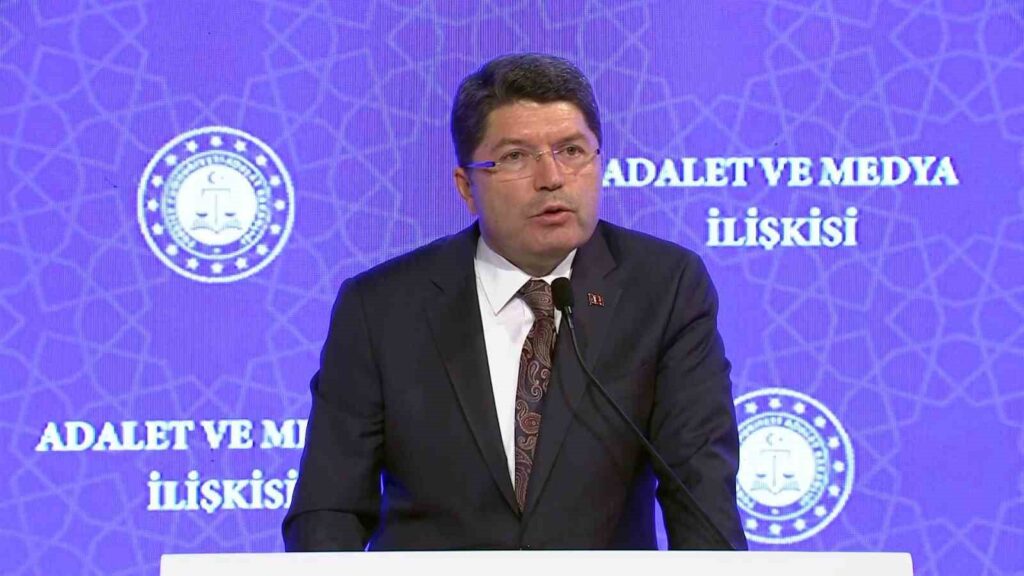
Justice Minister Yılmaz Tunç stated, “We are on the threshold of the Century of Turkey. In these days when we are stepping into the second century of our Republic, Turkey needs to continue its path with a democratic, civil, and participatory constitution. We need a new constitution that will allow us to progress towards a high-standard democracy, which does not allow coups, and is not interrupted by a coup or a memorandum every ten years.”
Justice Minister Yılmaz Tunç spoke at the panel titled “The Relationship Between Justice and Media: Justice is the Foundation of Property, Media is the Voice of Truth” organized by the Ministry of Justice in collaboration with the Presidency of Communications at Bahçeşehir University. Minister Tunç said, “Today we are together for a very important issue. With the hospitality of Bahçeşehir University and the contributions of our Presidency of Communications, we will hopefully carry out a full-day series of panels discussing the topic of ‘The Relationship Between Justice and Media’. All dimensions of the relationship between justice and media will be evaluated here today with the participation of representatives and editors-in-chief of our country’s leading media organizations in different panels. I sincerely believe that it will be very beneficial. Because we need to listen to them. The thoughts of our media representatives are very important to us. We are preparing a judicial reform strategy document. We are about to complete our preparations. As we have reached the final stage, we said that we need to discuss the relationship between ‘justice and media’, which has gained much more value, especially in recent years, by gathering the parties together. We need to listen to experienced journalists in this regard. I wholeheartedly believe that this meeting will provide significant outputs and shed light on the judicial reform strategy document.”
“I was tried in this place 25 years ago”
Stating that he was tried 25 years ago for advocating freedom for headscarves, Minister Tunç said, “I was tried 25 years ago in this place where Bahçeşehir University is located. This was the State Security Court. This is a sign of how far we have come and the distance we have covered in achieving high-standard democracy in our country. There were State Security Courts 25 years ago. A criminal indictment was prepared against us as young lawyers for advocating freedom for headscarves. We faced an indictment due to a signature for freedom for headscarves and were tried here. In the trial, a military judge with three members took our statement. Today, in that place, as an educational institution, I want to express my pleasure in being with you as the Minister of Justice of the Republic of Turkey, not as a defendant, but as part of a home where young people will sign the Turkey Century for the future of our country. We are all working together to achieve high-standard democracy in Turkey. We have made significant progress; we have come a long way. When we compare the past and present situations of the Turkish judiciary or the Turkish media, it should not be unfair to Turkey. We have made very significant progress.”
“While the nation was fighting coup plotters in the squares, the public prosecutors of this country rushed to the courts”
Justice Minister Tunç expressed that judicial members fought in the courthouse during the treacherous coup attempt on July 15, stating, “Turkish judiciary and justice have unfortunately aligned with the coup plotters during certain periods in the past, such as the May 27th, September 12th, and February 28th, instead of standing by democracy and the Turkish democratic rule of law. They supported them, provided constitutional support, and acted as a judicial system that did not protect the rights and law of the nation, but rather as a supporter of the tutelary mentality. This is, of course, a situation that should be taken as a lesson. We have left that judicial system behind. We demonstrated that Turkish judiciary is the people’s judiciary with the heroism shown on July 15. While our nation rushed to the squares against the coup plotters on July 15, the Turkish judicial members, including public prosecutors, did not sit at home. While the nation fought against coup plotters in the squares, sacrificing martyrs, the public prosecutors of this country rushed to the courts. They detained the coup plotters. They caught them and ensured they accounted for their actions before the judiciary. They protected the rights and law of the nation. That is the difference. Perhaps it is necessary to see that the criticisms directed at the Turkish judiciary today, including unjust criticisms, have this background. Unfortunately, during the years when the Turkish judiciary operated as a backyard of the tutelary mentality, it caused significant harm to the legal system. Those days are now behind us. The examination it passed on July 15 was truly commendable. It succeeded in fighting alongside its people against the tutelary mentality.”
“When we look at Turkish media, it both enlightens our nation and sends messages to the world”
Minister Tunç pointed out that instead of a media that acted as a spokesperson for coup plotters on September 12, February 28, and May 27, there is now a media that displayed heroism together with the judiciary and the nation on July 15, saying, “We should not pass this by without appreciation. Turkish media has given a great test. During the treacherous coup attempt on July 15, our televisions broadcasted live. Those voices could not be silenced. Those screens could not be darkened. Our journalists broadcasting on screens stood by the national will until the end. They said, ‘We must resist against the coup plotters as a nation; we must protect our independence,’ and the media played a significant role in mobilizing the nation to the squares. Regarding Palestine, since October 7, a genocide has been taking place before the eyes of the world. Nearly 50,000 people have been martyred. 80% of them are women and children. Unfortunately, is the international media currently able to protect the rights of the murdered children? Unfortunately, it is conducting a disinformation campaign that practically supports the perpetrators. On the other hand, when we look at the Turkish media, it both enlightens our nation and sends messages to the world. In the genocide case initiated by South Africa, in which Turkey also requested intervention, we have important evidence added to our file. As Turkish media, it has provided very important documents that will protect the rights of the oppressed in Palestine and serve as evidence in terms of international law, noting that history must record these matters. I remember all the martyrs who have been martyred in Palestine with mercy.”
“Justice is about protecting human dignity”
Minister Tunç stated that justice, as expressed by Hz. Mevlana, is about ‘putting everything in its rightful place,’ adding, “Justice is balance. Justice is about protecting human dignity. Where there is no justice, there can be no social peace and tranquility. Justice is the guarantee of social peace and tranquility. Justice is being able to hear the voice of the just amidst the harsh cries of the unjust. If a judge serving on the dais can hear the voice of the just while delivering justice, and can hear the faint voice amidst the harsh cries of the unjust, then justice can be delivered. This understanding is necessary. As artificial intelligence is utilized in every field, there are also possibilities for its use in the judiciary. We have preparations in this regard. Our UYAP system is the most advanced judicial network system in the world. Many European countries ask us how we achieved this. That is an advantage for us. We will develop it further now. We aim to further popularize electronic hearings in both criminal and civil cases, making access to justice easier and simplifying legislation. We have certain measures in place to prevent prolonged trials. In our judicial reform strategy document, after our President shared these one by one with the public, we will continue our efforts to develop our legislation in line with those goals. In the last 22 years, we have changed all our fundamental legislation. All our laws have been renewed. We renewed these 80-year-old laws that could no longer meet the needs. The important thing is the proper implementation of these laws. The best law can turn into the worst law in the hands of the worst implementer. Merely renewing the fundamental legislation is not enough. Our judges and prosecutors serving on the dais must prioritize the Constitution while applying laws. We all see that our constitution, especially because it is a coup constitution, causes certain problems and leads to discussions within the judicial system. The amendments made to our Constitution, both structural changes and those aimed at increasing the avenues for seeking rights related to fundamental rights and freedoms, have unfortunately caused a breakdown of uniformity among the articles of the Constitution regarding these changes that have been later integrated into the coup and tutelary narrative, and we see that this issue leads to different opinions among our judicial institutions. Despite these great efforts to reduce or eliminate the tutelary spirit in our Constitution, we have implemented significant reforms in our Constitution, including governance reform, which cannot be underestimated.”
“There is a need for a new constitution”
Minister Tunç mentioned that they made significant arrangements in the constitution concerning the press, stating, “The regulation that press tools cannot be confiscated was included in the constitution with the constitutional amendment in 2004. We have implemented regulations that further expand the scope of freedom of thought and expression, both constitutionally and at a lower level. We should not underestimate the efforts regarding press freedom. We have regulated in our legislation that expressions of opinion that do not exceed the limits of criticism and do not go beyond news value will not constitute a crime in our Turkish Penal Code, the Anti-Terror Law, and the Press Law. All these were arrangements aimed at further strengthening our country’s principle of democratic rule of law. We are on the threshold of the Century of Turkey. In these days when we are stepping into the second century of our Republic, Turkey needs to continue its path with a democratic, civil, and participatory constitution. Hopefully, we can achieve this. There is a need for a new constitution that will enable us to progress confidently towards a high-standard democracy that does not allow coups or is interrupted by a memorandum or coup every ten years, which makes our democracy stronger. Hopefully, this consensus will be realized in the parliament. Political parties and deputies who are inclined towards this consensus will certainly receive appreciation from our nation. Otherwise, our nation will respond to this when the time comes.”
“We see that disinformation saying ‘there is decay in the judiciary’ is deliberate”
Tunç explained the importance of the relationship between media and justice, saying, “There are also comments about justice on social media. Of course, judicial decisions can be criticized after they are made. There is no harm in this. In fact, these criticisms can facilitate the improvement of quality in the judiciary. Mistakes in judicial decisions can certainly occur. There are existing avenues for correcting erroneous decisions. However, criticizing the first-degree decision in the media before the appeal and cassation processes are completed, even exceeding the limits of criticism, while the appeal process is still being evaluated, leads to disinformation such as ‘there is decay in the judiciary.’ We see that these are deliberate. Of course, we respect good faith criticisms. They contribute to the development of the judiciary. While the case is still ongoing, the secrecy of the investigation is essential. Because the evidence that will be collected there should not be concealed. Without being knowledgeable about the content of the file, news like ‘could it be like this, could it be like that’ during the investigation phase leads to comments like ‘this was highly discussed, why is it not in the indictment’ when the indictment emerges. This, of course, damages trust in the judiciary. As an essential universal legal principle, the presumption of innocence and the right not to be stained should be maintained even during the investigation phase and before a judgment is rendered. If an investigation has been initiated against a person, or if the trial is ongoing, and before the judiciary has reached a decision, the media pre-emptively decides on a person’s guilt, leading to violations of the right not to be stained, this undoubtedly harms the delivery of justice. We also see that the reflection of the interaction on social media along with conventional media leads to different comments that will damage the judiciary regarding the decisions made by our judicial members. The presumption of innocence and the right not to be stained are very important areas of protection, and we have made significant legislative changes in our country regarding this. We have implemented many judicial regulations. One of the most important ones is the right not to be stained. The mechanism for declaring ‘no grounds for investigation’ did not exist in our country. It was introduced into our legislation only a few years ago. Approximately one and a half million decisions have been made declaring ‘no grounds for investigation.’ If this system did not exist, an investigation would be initiated against individuals, and if thereafter no prosecution was opened, that individual would be stained by the investigation. To prevent this, we have established the possibility of making decisions declaring ‘no grounds for investigation.’ This is also very important for the media. In the face of a complaint or report, if it is evident that there is no seriousness or no concrete evidence, the judiciary can make a decision of ‘no grounds for investigation’ without having to carry out any procedures on the person.”
“There is a limit to freedom of thought and expression”
Minister Tunç stated that in the past, decisions could not be made, and investigations had to be initiated, saying, “That person would appear on the headlines, but then you would see that there was no relation between that person and the incident. The presumption of innocence is one of the fundamental principles of law, and therefore the judiciary and the media must pay the utmost attention to the presumption of innocence. Our media has the responsibility to prevent citizens’ victimization, especially regarding disinformation on social media about individuals’ personal rights. We need to prevent that. Social media is a space of freedom. We are fully in favor of freedom of thought and expression. We should strive to expand it even further. However, freedom of thought and expression has its limits. Of course, this limit is not a restriction made according to one’s personal opinion. This restriction exists in both universal law and our own law. We support freedom of thought and expression to the fullest extent within these limits. Social media is not a space for committing crimes. If an act is a crime in real life, we cannot accept it as freedom of thought just because it was carried out on social media. Protecting personal rights is one of the most important duties of law. Protecting human dignity is the most crucial element of justice. Preventing crimes from being committed on social media is not easy with today’s technological means.”
“Social media companies have an obligation to comply with Turkish law”
Justice Minister Tunç reminded that social media companies have an obligation to comply with Turkish legal systems and laws, stating, “If you are broadcasting in Turkey, you must respect the laws of that country, as you benefit from the infrastructure of the Turkish system. If the people of that country are harmed due to the platform you provide, you must be held responsible for that harm. This responsibility exists for our press, but it is not legally possible to think that social media companies will not be responsible. During the implementation of this legislation, our judicial system faces criticism. However, this is very important in terms of protecting citizens’ rights. We are confronted with disinformation every minute. A video related to an event that was concluded five years ago is used to create disinformation. Some of our journalists share this. Our ballerina Ceren Özdemir was subjected to a massacre in Ordu. The perpetrator was sentenced to aggravated life imprisonment. One of our journalists published a story stating, ‘The murderer was transferred from a high-security prison to an open prison.’ Social media exploded. We intervened in the matter. We stated that this person was serving their sentence in a high-security prison. The false news circulated around the world. Our true news was limited. The recipients of falsehoods are somewhat higher. Our Presidency of Communications plays a significant role in these situations. It is much more important to provide our citizens with accurate information. Twelve million decisions are made annually. A few negative decisions among them can lead to criticism of the entire system. Accurate information is truly appreciated, and legitimate criticism has a place above our heads. However, if it is directed towards disinformation, our justice is damaged. We are all performing a public service together. Our judicial members and media members are both performing critical roles. While performing this critical duty, we sometimes need to discuss the relationship between justice and media.



